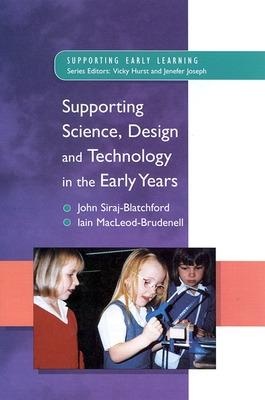Supporting Early Learning
3 total works
Supporting Ict in the Early Years
by John Siraj-Blatchford, David Whitebread, and Siraj-Blatchford
Published 1 January 2003
The primary aim of this new volume in the Supporting Early Learning series is to help readers understand how very young children (from birth to six) develop an early awareness, and subsequently develop their knowledge, skills and understandings of information and communication technologies (ICTs). The rapid growth of ICT has prompted concerns among parents, educators and policy-makers over the suitability of many educational applications, and electronic toys, for young children. However, evidence is presented to show that the use of ICT by young children is compatible with the principles of a developmentally appropriate curriculum (DAC). In fact the authors argue that used imaginatively, many applications of ICT can make a significant and unique contribution to children's social and cognitive development.
The authors show how parents and other carers, teachers, and other professionals are already providing a rich learning environment in this area of experience.
The authors show how parents and other carers, teachers, and other professionals are already providing a rich learning environment in this area of experience.
Supporting Identity, Diversity and Language in the Early Years
by Iram Siraj-Blatchford and Siraj-Blatchford
Published 1 January 2000
This book provides the main ingredients for professional development in working with young children in a diverse society. It fills the gap that most early years training neglects, that is, how to work with children in developing a positive disposition towards themselves regardless of their differences. By helping children to develop a strong self-identity and good self-esteem we set the foundations for positive attitudes towards others and towards learning. Practical advice, real examples and staff activities bring the book to life. The book provides clear evidence and practical guidance on how to develop young children's emerging language, especially those children who have English as an additional language, and how to generate, activate and assess curriculum for diversity. The book focuses on all children's learning for cultural diversity. Culture is used as a broad term to include language, ethnicity, social class and gender. Each chapter offers a clear combination of theory and practice and ends with excellent staff development activities and further readings. The book will be important reading for all students and practitioners working with young children.
Supporting Science, Design and Technology in the Early Years
by Siraj-Blatchford and Iain MacLeod-Brudenell
Published 1 January 1999
* How do young children learn science, design and technology?
* How can we support young children and help them to develop scientific, design and technology skills?
This practical and accessible text answers these questions and provides guidance for adults working with young children in a variety of formal and informal settings. Concrete advice is given to show how parents, carers, teachers and other professionals can provide a rich learning environment and support children in this important area of the curriculum. The differing needs of both adults and children are recognized and a variety of stimulating activities is illustrated. A clear and helpful discussion of a developmental framework enables readers to strengthen their own practice and understanding. The book will be of value to all early childhood professionals as well as being of great interest to parents and carers.
* How can we support young children and help them to develop scientific, design and technology skills?
This practical and accessible text answers these questions and provides guidance for adults working with young children in a variety of formal and informal settings. Concrete advice is given to show how parents, carers, teachers and other professionals can provide a rich learning environment and support children in this important area of the curriculum. The differing needs of both adults and children are recognized and a variety of stimulating activities is illustrated. A clear and helpful discussion of a developmental framework enables readers to strengthen their own practice and understanding. The book will be of value to all early childhood professionals as well as being of great interest to parents and carers.

